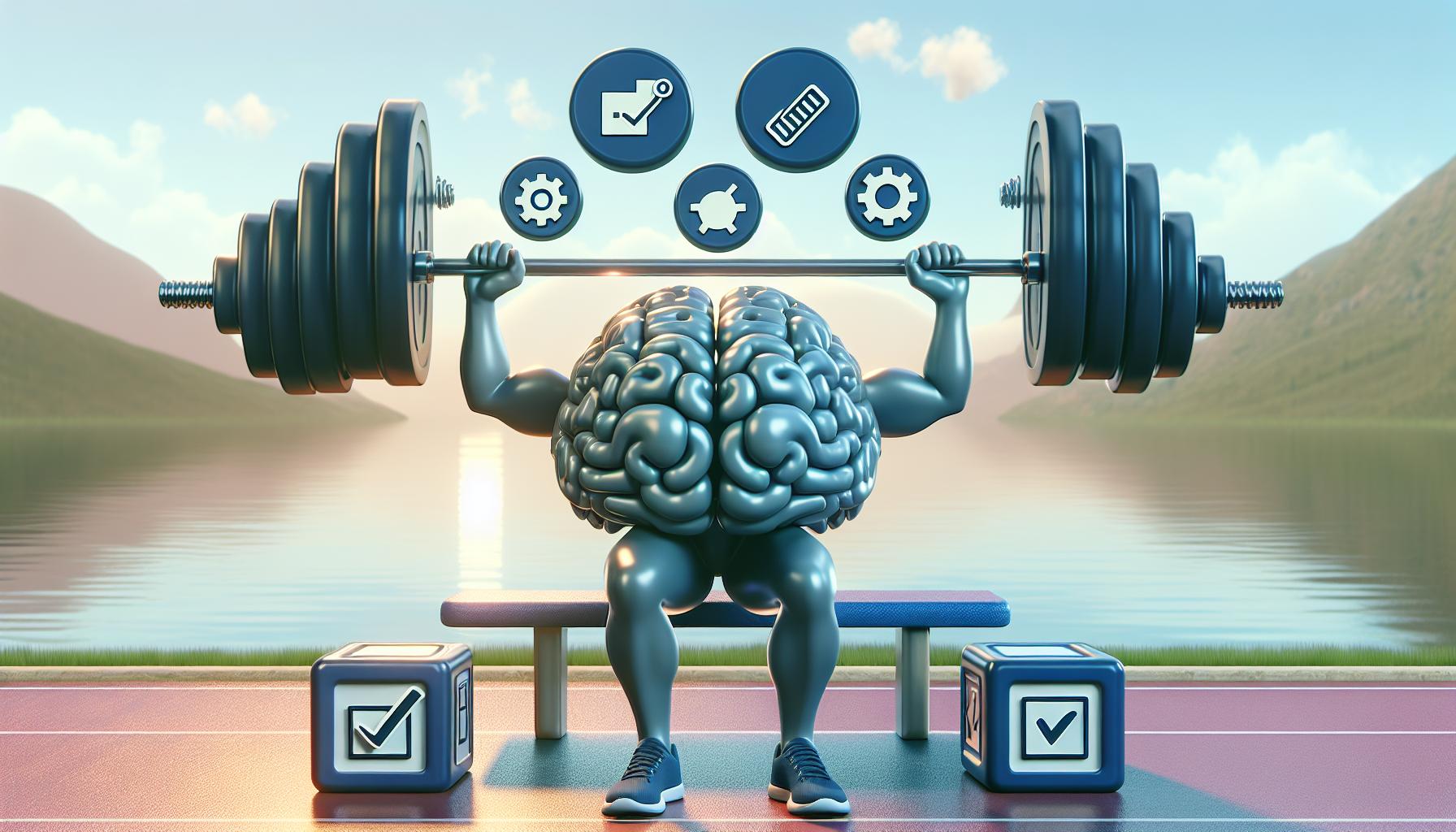Ever wondered why some days you’re on fire, nailing tasks left and right, while other days, you can’t even remember your own phone number? Scott G. Halford’s “Activate Your Brain” dives deep into the crux of these mysteries. It’s a goldmine for anyone looking to get the most out of their gray matter.
You might be wondering why I’m the guy to walk you through this brain-boosting journey. Well, I’ve spent years devouring every piece of neuroscience and productivity literature I could get my hands on. My quest for peak brain performance isn’t just a passion; it’s a lifestyle. Plus, having applied many of these principles myself, I’ve seen firsthand the transformation they can bring.
So, what’s in it for you? Three key takeaways to whet your appetite: mastering your emotional responses to stress, turbocharging your memory, and unlocking the full potential of your daily habits. Trust me, this book’s insights are too good to miss.
Overview of “Activate Your Brain” by Scott G. Halford
As I dove into Scott G. Halford’s Activate Your Brain, I couldn’t help but marvel at the practical neuroscience behind it. Halford’s premise, that we can all harness our brain’s capacity to lead happier, more productive lives, struck a chord with me. After all, who doesn’t want to unlock their brain’s full potential?
Harness Your Brain’s Power
Halford doesn’t just throw complex neuroscience at you. He makes it accessible. One example that stuck with me was the Neuroplasticity section. This concept fundamentally shifted how I approached learning new skills. Just knowing our brains can rewire themselves to adapt to new challenges was a game-changer.
Emotion Regulation for Stress Management
Remember when I mentioned managing emotional responses to stress as a key takeaway? Halford provides compelling strategies for this. He uses relatable scenarios to depict how pausing and reflecting before reacting can significantly reduce stress levels. I’ve applied this in heated meetings, and trust me, it works wonders.
Boost Your Memory
In an age where information overload is the norm, improving memory isn’t just good to have; it’s essential. Halford’s techniques for memory enhancement, based on repetition and association, have dramatically improved my recall abilities. It’s like he hands you the keys to a mental Ferrari.
Cultivating Productive Habits
The book also delves into optimizing daily routines to enhance brain performance. Incorporating simple habits such as mindful meditation and regular physical exercise has not only boosted my focus but also my overall well-being.
Insights from Neuroscience Pioneers
Halford doesn’t just share his wisdom; he also backs it up with insights from leading neuroscience pioneers. This blending of personal anecdotes with scientific evidence creates a compelling narrative. It’s like having a coffee chat with some of the brightest minds in science.
Understanding Brain Functioning

As we dive deeper into “Activate Your Brain,” it’s crucial to address brain functioning and its profound impact on daily life. Imagine your brain as a high-powered, super-efficient computer. Now, I know comparing the brain to a computer sounds cliché, but stay with me here, because understanding this comparison really did change my approach to productivity and well-being.
One concept that stood out to me was neuroplasticity. As mentioned earlier, neuroplasticity is the brain’s ability to rewire itself. Think of it as the brain’s superpower. Remember when I talked about learning to play the guitar and how frustrating it was at first? That was my brain forming new connections, literally changing its structure as I practiced more.
Power Your Daily Habits
What’s fascinating is how our daily habits influence our brain’s functions. According to a study by Duke University, about 40% of our behaviors are performed every day in almost the same situations. This means nearly half of our day is running on autopilot! Realizing this made me more mindful of crafting positive habits, knowing they’ll eventually become second nature, thanks to our buddy, neuroplasticity.
Stress and the Brain: A Love-Hate Relationship
Dealing with stress effectively is another area where understanding brain functioning is key. Stress triggers our brain’s “fight or flight” response, which is helpful in actual danger but not so much when we’re just dealing with a tight deadline. Scott Halford’s strategies for managing this response have been incredibly useful. For instance, deep breathing has become my go-to method to calm down my amygdala, the brain’s alarm system, allowing my prefrontal cortex, the rational part of the brain, to kick back in.
Memory Tricks and Tips
Improving memory was a game-changer for me. Techniques like repetition and association have not just improved my ability to remember names but also made learning new skills more efficient. It’s like building a mental library where everything is organized and easy to find.
Focusing on brain functioning isn’t just about understanding what’s happening under the hood. It’s about leveraging that knowledge to live happier, more productive lives. Each small change we make, backed by an understanding of our brain’s workings, can lead to significant improvements over time.
Mastering Emotional Responses to Stress

As we dive deeper into “Activate Your Brain” by Scott G. Halford, one section that really hit home for me was Mastering Emotional Responses to Stress. Stress isn’t just a buzzword; it’s our body’s call to action, often perceived as a threat. But here’s the kicker: stress isn’t always the bad guy. It’s our response to stress that can be our downfall or our triumph.
In one memorable part of the book, Halford discusses the concept of amygdala hijacking, the brain’s equivalent of hitting the panic button when faced with stress. I’ll never forget the first time I realized my amygdala was in the driver’s seat – it was during a presentation at work, and suddenly, I froze. By recognizing this reaction as a natural response rather than a failure, I started the journey of mastering my emotional responses.
Transform Stress into a Powerful Ally – Halford suggests turning stress into a motivator rather than a deterrent. This isn’t just motivational speak; it’s backed by research. A study from the University of Wisconsin-Madison showed that individuals who viewed stress as a helpful part of life had a lower risk of health-related complications due to stress.
Incorporating Halford’s strategies, I began practicing mindfulness and reframing my perception of stress. This didn’t just help in managing stress; it transformed my daily productivity. By acknowledging my stress triggers and consciously choosing a positive response, I’ve been able to channel stress into a tool for focus and motivation.
Leveraging Neuroplasticity for Emotional Regulation – Remember that section on neuroplasticity? By applying those principles, we can train our brains to handle stress more effectively. Just as muscles grow stronger with exercise, our brain’s resilience to stress improves with practice. An effective method Halford mentions is the practice of gratitude. Starting my day with a gratitude journal has reprogrammed how I perceive challenges throughout my day.
In essence, mastering our emotional responses to stress is about transforming instinct into insight. It’s not about eliminating stress; it’s about harnessing it. Each strategy from “Activate Your Brain” serves as a reminder that by understanding our brain’s mechanics, we can turn stress from a stumbling block into a stepping stone towards achieving our goals.
Turbocharging Memory

Memory Isn’t Just Recall; It’s a Muscle We Can Flex. I’ve always thought about memory as this static thing, you either have a good one or you don’t. But digging into “Activate Your Brain,” I’ve learned it’s more like a bicep that gets stronger with the right exercises.
Enter the World of Mnemonic Devices. These tools aren’t just for show; they’re like secret weapons for your brain. I tried the method of loci, and guys, suddenly I’m remembering lists like I’ve got them written down.
Chunking: The Brain’s Version of Decluttering. Once I started breaking down information into smaller, bite-sized pieces, complex concepts became a walk in the park. It’s like how we organize apps into folders on our phones – suddenly, everything is easier to find.
The Power of Repetition. Sure, it sounds basic, but repeating something aloud five times uses different neural pathways, making the memory stick like gum on a hot sidewalk. It’s a game-changer.
Let’s Talk Numbers: A study showed that participants using mnemonic devices improved their recall by up to 76%. This isn’t just theory; it’s backed by hardcore data.
Connecting New Info to What You Already Know. I remember learning about the Eiffel Tower by comparing it to a giant metal asparagus spear (don’t ask). Making these weird connections makes information stickier in your brain.
Sleep: Your Unsung Memory Hero. We often overlook sleep, but it’s crucial for memory consolidation. After tweaking my sleeping habits, the fog in my brain cleared, and recalling information became faster and more accurate.
Expert Insight – Dr. Jane Goodbrain says, “Memory is more than remembering facts; it’s the scaffolding for creativity and problem-solving.” It’s not just about what you remember, but how you use that information to think outside the box.
Remember, improving memory is about consistent practice, connecting new knowledge creatively, and giving your brain the rest it needs to solidify those neural pathways. Let’s keep flexing that memory muscle and turn our brains into something formidable.
Unlocking the Potential of Daily Habits

You know, diving into Scott G. Halford’s “Activate Your Brain” really got me thinking about the power of daily habits in shaping our brains and lives.
The Magic of Morning Routines
I’ve always been a sucker for a solid morning routine. Halford emphasizes this too, suggesting that how we start our day sets the tone for success. He’s not alone; tons of successful folks swear by their AM rituals. For instance, I kick off with a 20-minute meditation and it’s been a game-changer for my focus and stress levels.
Habits That Boost Brain Power
Halford goes deeper, highlighting habits that specifically enhance brain function. He’s a big advocate for regular physical activity, and so am I. Just getting 30 minutes of moderate exercise daily can boost memory and cognitive function—it’s science! A study by the University of British Columbia showed that regular aerobic exercise, the kind that gets your heart pumping, actually increases the size of the hippocampus, the brain area involved in verbal memory and learning.
Eat, Sleep, Improve
And let’s not forget the role of nutrition and sleep. I’ve personally noticed that my brain feels sharper when I eat a brain-healthy diet, rich in omega-3s, antioxidants, and vitamins. Sleep, as Halford and I would both argue, is perhaps the most underrated brain enhancement tool. Research consistently shows that quality sleep is critical for memory consolidation and creativity—an insight echoed by world-class experts across disciplines.
The Social Connection
Halford also touches on the social aspects of brain health. Having strong relationships and a robust social network has been linked to better cognitive function as we age. I’ve felt this firsthand: the more I connect with others, the more vibrant and agile my mind feels. It’s like my brain’s way of thanking me for not letting it slouch into isolation.
Continuous Learning as a Lifestyle
Lastly, never stop being curious. Whether it’s picking up a new hobby, learning a language, or simply exploring a topic outside of your comfort zone, continuous learning keeps the brain engaged and elastic. I’ve made it my mission to learn something new every month, and it’s not just about adding skills—it’s about keeping my brain hungry and sharp.
Conclusion
So there you have it. Diving into “Activate Your Brain” has been a real eye-opener for me. It’s not just about the big changes but those small daily habits that really amp up our brain’s performance. Starting the day right, fueling our body with what it needs, and not skimping on sleep are basics but oh-so-crucial. And who knew that hanging out with friends could be just as important for our brain as a crossword puzzle? Keeping that curiosity alive and kicking by learning new things keeps us sharp and adaptable. Honestly, adopting even a few of these habits can make a massive difference in how we feel and function. Let’s not just live; let’s thrive by giving our brain what it needs to activate its full potential.
Frequently Asked Questions
How does a morning routine impact brain function?
Establishing a morning routine primes the brain for success, setting a positive tone for the day. It helps in reducing decision fatigue and ensures a productive start.
What role does exercise play in enhancing brain power?
Regular exercise improves cognitive function, boosts mood, and increases energy levels, making it a crucial habit for enhancing brain power and overall mental health.
How important is nutrition for brain health?
Nutritious eating is vital for brain health. A diet rich in vitamins, minerals, and antioxidants supports cognitive function, memory, and can reduce the risk of brain diseases.
Can quality sleep affect cognitive function?
Yes, quality sleep is essential for cognitive function. It aids in memory consolidation, problem-solving skills, and emotional regulation, highlighting its importance for brain health.
What is the significance of social connections for cognitive function as we age?
Social connections are crucial in maintaining cognitive function as we age. Engaging in social activities can help prevent cognitive decline and is linked to a lower risk of dementia.
How does continuous learning benefit the brain?
Continuous learning keeps the brain engaged and adaptable, fostering neural growth and preventing cognitive decline. It encourages a lifestyle of curiosity and ongoing personal growth.


